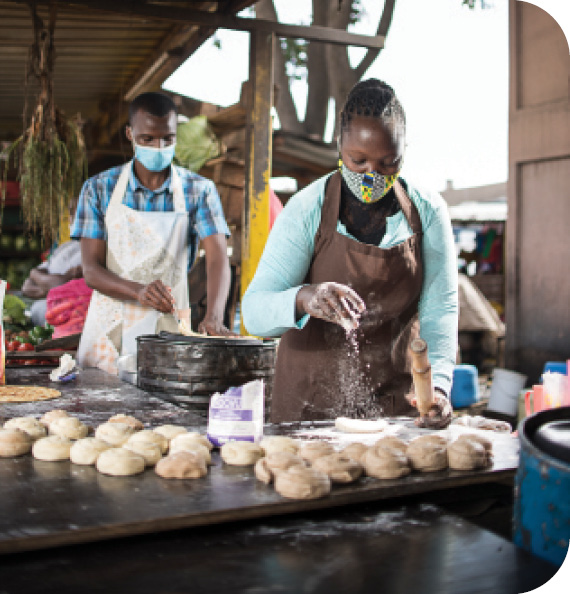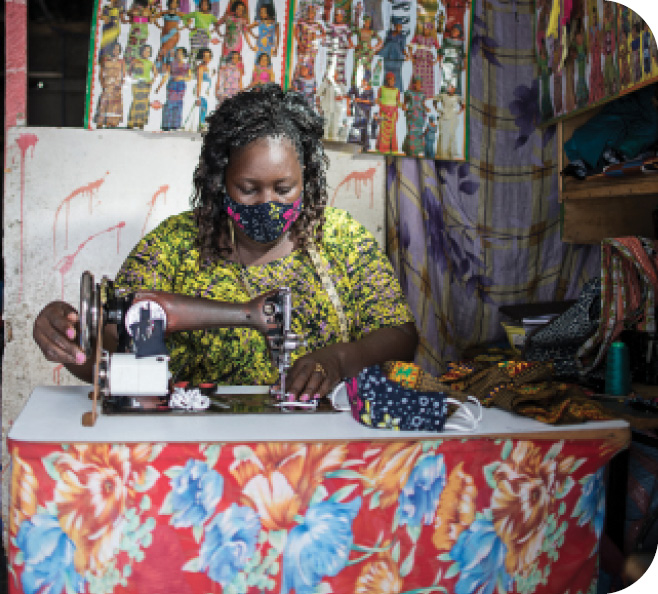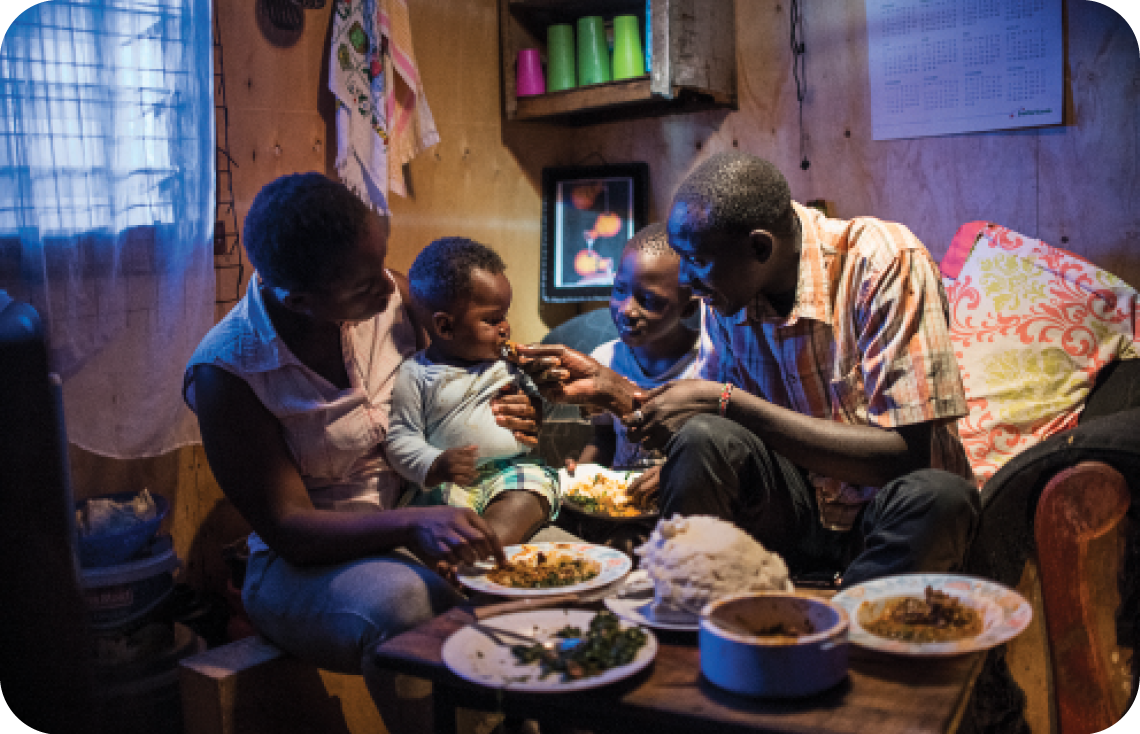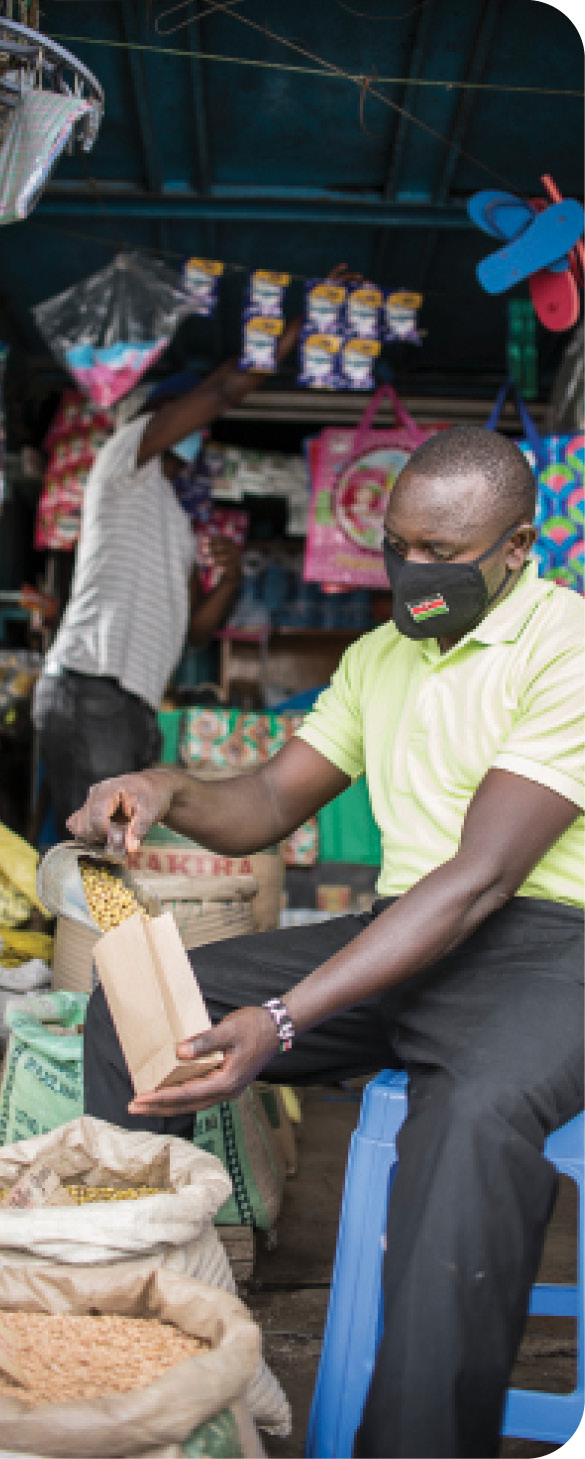SDGs and materiality
The United Nation’s Sustainable Development Goals (SDGs) are a global call to action to end poverty, protect the planet and ensure all people can enjoy peace and prosperity by 2030.
Since their launch in 2015, the SDGs have become a central pillar of our business, positioning sustainable development as part of our culture at Safaricom.
We have identified the nine SDGs where we believe we have the greatest opportunity to make a lasting difference.We have integrated the selected SDGs below into our strategy and operations.
Since 2018 all employees have integrated the goals by including SDG-related commitments in their annual performance objectives
 |
Good health and wellbeing Our mobile technologies such as M-TIBA, a health payments solution which enables low-income earners to save towards healthcare expenses, transform lives by improving access to quality and affordable healthcare services and promoting wellbeing. |
 |
Quality education We are committed to increasing access to educational opportunities through innovation, products and services including Shupavu 291 and our M-PESA Foundation Academy. |
 |
Affordable and clean energy We are working to transition our network sites to clean energy, roll out new green/hybrid sites and find innovative ways to provide and promote clean energy solutions throughout Kenya. |
 |
Decent work and economic growth Our greatest contribution is through the jobs we create, both direct and indirect, across the value chain, our contribution to financial inclusion, and the taxes we pay. We empower our employees and we support young entrepreneurs through the work of the Safaricom Foundation and other initiatives. |
 |
Industry, innovation and infrastructure We aim to provide quality connectivity and innovative, relevant products and services, to serve the needs of society. Expanding the quality, coverage and availability of our networks is paramount to support economic development and transform lives. We are growing the network in remote areas in Kenya while expanding the fibre-optic network and developing global, human-centred products. |
 |
Reduced inequalities We leverage our leadership, network, technology and solutions to promote equal access to opportunities to succeed, especially for those who face obstacles. Key activities include expanding our diversity agenda, developing our Women in Business programme and enhancing access to our products and services by addressing affordability of smart devices and data plans. |
| Responsible consumption and production We strive to manage our potential negative environmental impacts and we encourage our stakeholders to do the same. Our focus is on embracing circularity, eliminating plastic, digitising practices and processes to increase efficiency and reduce waste, and supporting global advocacy initiatives. |
|
 |
Peace, justice and strong institutions We are committed to running a responsible and ethical business and we practice and uphold strong governance and ethical standards. We aim to report our progress and performance honestly and transparently and we engage openly with key stakeholder groups. |
 |
Partnerships for the goals Partnerships are embedded in our business model; we work together with individuals, organisations and countries to support and sustain many of the targets set out in the SDGs. We collaborate with organisations that share our purpose of ‘transforming lives’ and our values with regard to ethics, diversity and inclusion and environmental responsibility to promote financial inclusion, education, health, agriculture and empowerment initiatives. |
Our five material issues

We continuously assess our governance operating model to ensure robust internal governing bodies and proper systems and processes. These support the Executive team in driving change, setting strategic direction and formulating high-level goals and policies centered around creating opportunities for economic advancement that are accessible to all levels of society.
Improving risk management
We continuously enhance our internal systems to mitigate risks such as fraud, cyber risks and market disruptions and to improve efficiency and effectiveness. During the year we conducted Enterprise Risk Management training for our Board and increased the scope of our business continuity tests. The constitution of a risk management committee has improved our oversight of risk management initiatives.
Ethical behaviour
Staff ethics training was conducted via webinars supplemented by e-learning, with 98.5% of staff receiving training in the last financial year. We also raised awareness by conducting ethics training sessions, together with fraud training for our suppliers, M-PESA agents and dealers. Topics covered included risk management best practices, regulatory requirements, common fraud types and how to avoid them, whistleblowing and suspicious activity reporting, cyber and information security as well as physical security for businesses.
Protecting customers
We have launched a customer awareness drive to protect stakeholders from identity theft and social engineering fraud. We highlighted the issues through an above-the-line campaign under the tag Jichanue and Take Control, using radio, TV and digital channels.
In a significant development, we established Fraud Management Squads specialising in analytics, customer awareness and process review to drive customer safety through accelerated use of machine learning and automations, continuous customer fraud awareness and process reviews.

A sound regulatory system is crucial for supporting growth of our industry. It enables fair competition between businesses and enforces good practices. This in turn drives the inclusive participation of all parts of society in economic and social activities. We are committed to compliance with regulatory requirements, and we assess our process against all applicable laws and regulations.
Regulatory compliance
Recognising that our reputation is what sets us aside and gives our brand power in the marketplace, regulatory compliance is a priority. We avoid a tick-box approach, going further than legal obligations to achieve our own internal standards of compliance. This is highlighted by the fact that, in FY21, we surpassed the regulatory Quality of Service (QoS) score of 80% by attaining 92% in the QoS assessment conducted by the Authority. Pleasingly, we continued the four-year trend of no fines or sanctions for non-compliance with regulations and no legal actions lodged for anti-competitive behaviour. Environmental compliance and management is entrenched through our ISO 14001 and ISO 50001 certifications.
Engagement with our regulators
During the reporting period we successfully negotiated with the Regulator to delay the implementation of numbering fees to cushion subscribers from the adverse effects of increased costs in a period where households had lost income.
We also engaged with:
- the Central Bank of Kenya, which seeks to supervise digital lenders and the Communications Authority regarding allocation of emergency spectrum which enabled us to continue serving our customers during a time when the country was transitioning to virtual services
- the regulator regarding the implementation of the Data Protection Act.
We have continued to evaluate the potential of 5G in our markets and work with the technology team to ensure regulatory support for the allocation of the spectrum required for our trials.
Our platforms are essential to the continuity and long-term sustainability of our business. They are the foundation of all our operations, delivering our services and enabling us to transform lives. The quality, coverage and availability of our network are paramount to maintaining our competitive advantage in a highly competitive industry.
Quality of Service
For the fifth year running, we were first in all QoS results – in terms of voice; this includes the call setup success rate, the dropped call ratio and speech quality. In terms of data, this includes mean web browsing session time and network delays, as well as both download and upload mean user data rates.
Following the formation of a task team, call centre interactions reduced from 190,000 in the previous financial year to 117,000 in FY21.
Availability and coverage
There was a significant increase in demand for mobile data, driven by our customers continuing to work from home and needing to stay in touch during the pandemic. We added 1,045 4G sites, moving from 77% to 94% and enabling connectivity for customers who reside in areas where fibre is yet to be rolled out. A total of 5,410 homes took up the 4G LTE product. Notably, we also moved forward to trial 5G technology for our customers with the aim of empowering them with super-fast internet at work, at home and when on the move, supplementing our growing fibre network. The 5G technology can easily act as an alternative to home fibre and fibre for business services, targeting customers in places where we have yet to roll out our fibre network.
Our upgrade of optical networks through an expanding footprint means that our customers now enjoy higher capacity on fibre and reduced reliance on microwave. All technical deployments were conducted with minimal disruptions to service. Upgrading our optical networks improved and increased backbone transmission capacity, ensuring that Safaricom is future proofed against the anticipated growth in traffic and well positioned for the provision of other supplementary services.

Responsible environmental stewardship is vital to reducing inequalities and maintaining our licence to operate. Our operations impact on the environment and we take responsibility for managing our impacts and reporting our progress honestly and transparently.
Towards net-zero carbon emissions
Our ambition is to be carbon-neutral by 2050. We aim to achieve 74% overall reduction in our emissions by 2050, with the remaining 26% – largely comprising Scope 3 emissions – to be offset through various initiatives including solar installations and carbon offset programmes. While we were not able to meet our target in FY21, mainly because of our network expansion, we have put in place measure and initiatives to maximise energy efficiency and our use of renewable energy. Our main focus is on reducing Scope 1 emissions, particularly those related to fuel usage for energy generation in our operations. We are also working to connect our sites to the national grid, which uses largely green energy from Hydroelectric and geothermal sources.
Solar solutions
Accelerating solar sites within the Safaricom network was initially hampered because of space limitations and remote monitoring capabilities. The lack of remote monitoring devices resulted in reduced capacity of solar sites owing to sabotage. Accordingly, we developed robust solar designs which occupy minimum space, use lithium-ion batteries and have built-in remote monitoring. There has been a positive performance in acceleration of functional and high-capacity solar solutions in the network. So far, 34 x 12kva solar sites with remote monitoring capabilities have been deployed resulting in reduction of generator relative humidity by up to 85%. Consequently, fuel supplied to these sites has reduced by about 80%.
Carbon offset programme
We continued with our carbon offset programme in terms of which we have a partnership with the Kenyan Forestry Service with a target of growing 5 million trees over five years. Despite the COVID-19 related restrictions, we planted 650,000 trees in over 650 hectares on three key sites (Kieni, Marmanet and Nandi) for carbon offsets. Over 1,000 community members were involved in and benefited from the project, which has both social and environmental components.

We focus on delivering products and services inspired by the needs of our customers, many of whom are early adopters of new, cutting-edge technology. Innovative solutions bring access to new technology, markets and ways of working, and as such are integral to supporting financial inclusion. Safaricom recognises that collaborating with partners has the potential to release immense synergies and increase speed to market.
Accelerating growth through partnerships
Together with South Africa’s Vodacom, we acquired M-PESA, one of the largest mobile money platforms in the African region. The platform has nearly 40 million users and processes over one billion transactions every month. We are excited by the fact that the management, support and development of the M-PESA platform has now been relocated to Kenya, where the journey to transform the world of mobile payments began 13 years ago. This new partnership with Vodacom will allow us to consolidate our platform development, synchronise more closely our product roadmaps, and improve our operational capabilities into a single, fully converged Centre of Excellence.
Leading a bid for a joint venture (JV) in Ethiopia
In November 2020, Ethiopia, a country of 110 million people with one of the world’s last closed telecoms markets, announced the opening of a bid for a telecoms licence. We participated in the bidding process under the auspices of a consortium in which we hold the majority share. The other consortium partners are Vodacom, Sumitomo the Japanese conglomerate and CDC, the UK sovereign investment fund. After year end, it was announced that our consortium had won the bid and we are in the process of setting up operations to deliver a world class network experience to the Ethiopian people.
Driving smartphone adoption with Google and Android
One of the most significant barriers to mobile internet adoption has always been that of smartphone affordability. Access to smartphone devices in Kenya is still quite low with many Kenyans still on 2G and 3G devices. Accordingly, we partnered with Google and Android in a mobile financing project known as Lipa Mdogo Mdogo which focuses on enabling Kenyans’ access to 4G-enabled smartphones. In terms of the partnership, qualifying customers can buy 4G-enabled smartphones and pay them off in very low instalments a day over a period of 12 months. This has the potential to open up a new world, particularly for MSMEs, as 4G connects them to the economic opportunities presented by internet access, thereby enhancing national growth and economic inclusion. Through Lipa Mdogo Mdogo, 250,000 customers made use of the offer, with over 60% upgrading from 2G and 3G to 4G devices.
